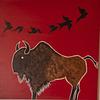Take a photo of a barcode or cover
942 reviews for:
The Obstacle is the Way: The Timeless Art of Turning Trials into Triumph
Ryan Holiday
942 reviews for:
The Obstacle is the Way: The Timeless Art of Turning Trials into Triumph
Ryan Holiday
I loved this book. It gave me a new perspective and a shit ton of awesome quotes to add to my collection. I’ll revisit often.
challenging
hopeful
informative
inspiring
reflective
fast-paced
An Informative, well written handbook that teaches the reader a straight-forward philosophy on turning perceived obstacles into catalysts for growing and becoming stronger. Ive trained myself to be pretty good at this over the years and can definitely say it has helped shape my life for the better. This book was a great read because the author used the lives of past philosophers, presidents, inventors etc to really drive home his points and show you first hand how each person overcame specific obstacles using them.
***Sidenote*** If you get the audiobook version at the end is a bonus 60min interview with the author and Tim Ferris author of The Four Hour Workweek that I found very informative.
Tony Rogers Jr
Author of Visionary:Making a difference in a world that needs YOU
***Sidenote*** If you get the audiobook version at the end is a bonus 60min interview with the author and Tim Ferris author of The Four Hour Workweek that I found very informative.
Tony Rogers Jr
Author of Visionary:Making a difference in a world that needs YOU
Reading about stoicism to end 2021. Nice book. The audiobook version has an interview between Tim Ferris and Ryan Holiday and that's the best part :)
inspiring
lighthearted
slow-paced
Repetitive pep talk, unnecessary positive affirmations, and incomplete anecdotes with no references to back them.
This feels like a thought vomit that the author has been collecting in his diary for years.
This book was a shameless waste of ink and paper. It was a travesty that they killed so many trees for this rubbish that should have been a blog post or a tweet.
I appreciate the main idea of the author, which is that challenges are not barriers but opportunities for growth. I think this is a valuable perspective to have in life, especially when things get tough.
However, I find the author’s writing style problematic.
Reading this book felt like listening to a motivational speaker who didn’t know what he was talking about. There was no research. The book heavily relied on bits and pieces that we read on social media about famous people. George Clooney changed his behavior and got a job. Really? Where is the evidence? How do you know that his behavior change was the key to his success? What exactly did he change and how? Did he confide in you personally? The book is full of examples that are just the author’s idealistic observation about people and situations. He was constantly telling us not to see the world through rose colored glasses, but that’s exactly what he did while writing this book. He didn’t use any scientific studies to prove his point.
I understand his intentions with these examples. The problem is that he does not go into detail. He just skims over the main idea of the story without explaining how it relates to his argument. And how we can learn to be more like those people. What someone did in certain situations doesn't help me. I already know that staying positive when faced with difficult situations can help, but how can we achieve that ?
Steve Jobs made his employees work non-stop for days, and I am supposed to be inspired by him?
Field Marshal thought war was a game, and I should admire him?
This feels like a thought vomit that the author has been collecting in his diary for years.
This book was a shameless waste of ink and paper. It was a travesty that they killed so many trees for this rubbish that should have been a blog post or a tweet.
I appreciate the main idea of the author, which is that challenges are not barriers but opportunities for growth. I think this is a valuable perspective to have in life, especially when things get tough.
However, I find the author’s writing style problematic.
Reading this book felt like listening to a motivational speaker who didn’t know what he was talking about. There was no research. The book heavily relied on bits and pieces that we read on social media about famous people. George Clooney changed his behavior and got a job. Really? Where is the evidence? How do you know that his behavior change was the key to his success? What exactly did he change and how? Did he confide in you personally? The book is full of examples that are just the author’s idealistic observation about people and situations. He was constantly telling us not to see the world through rose colored glasses, but that’s exactly what he did while writing this book. He didn’t use any scientific studies to prove his point.
I understand his intentions with these examples. The problem is that he does not go into detail. He just skims over the main idea of the story without explaining how it relates to his argument. And how we can learn to be more like those people. What someone did in certain situations doesn't help me. I already know that staying positive when faced with difficult situations can help, but how can we achieve that ?
Steve Jobs made his employees work non-stop for days, and I am supposed to be inspired by him?
Field Marshal thought war was a game, and I should admire him?
Didn't like it. I just listened to it and nothing stuck in my mind. Quite disappointing, as I like "The Ego is the Enemy". However, at least I was reminded to read Marcus Aurelius "Meditations" so it was not a total waste.
hopeful
informative
inspiring
medium-paced
This is a short, simple book bursting with advice on how to - to quote Queen Latifah - whip whatever comes your way. It's not preachy, it's not specific to running a Silicon Valley start-up, and it's not a bunch of feel-good bullshit. What it is is a modern exploration of the ideas of the Stoics, specifically Marcus Aurelius and Epictetus, with a little Amelia Earhart and even Henry Rollins tossed in for good measure. Holiday is a clear communicator, breaking his ideas into small, concentrated chapters. Probably the best compliment I can give this book is to say that I borrowed it from the library, held onto it past its due date, and am now going to buy it so I have it close on hand.
I felt like this book was a giant cliche. The anecdotes and quotes were interesting and sometimes inspiring, but the authors own interpretation, etc.—though long-winded—left much to be desired. The was a great lack of any actual insight and a great surplus of words.
Just little stories/people that live by a way of stoicism. Maybe I’ll pick it up later.



